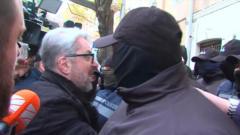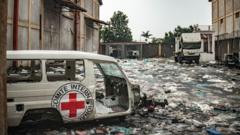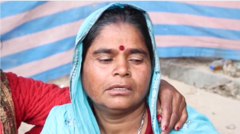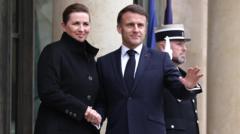Police violence marks the rising unrest in Georgia following the government's suspension of EU accession talks.
**Georgian Opposition Leader Faces Police Crackdown Amid Pro-EU Protests**

**Georgian Opposition Leader Faces Police Crackdown Amid Pro-EU Protests**
In Tbilisi, tensions rise as police detain opposition figures during ongoing demonstrations.
One of Georgia's notable opposition leaders, Nika Gvaramia, was forcibly removed from his party's headquarters by police following the Prime Minister's assertion that those responsible for a series of pro-EU protests would be held accountable for what he termed "violent actions." Gvaramia, 48, was carried away from his party's office in Tbilisi, amid a wave of nightly protests ignited by the ruling Georgian Dream party's shocking decision to halt the country's efforts to initiate conversations for joining the European Union.
These protests have rapidly escalated since they began the previous Thursday, with over 330 demonstrators reported arrested and numerous accounts of detainees suffering beatings while in custody. Prime Minister Irakli Kobakhidze's rhetoric has shifted towards accusing protesters of inciting "liberal fascism," raising concerns about government repression.
The demonstrations originated in response to a highly contentious election that had been marred by numerous irregularities, but they intensified after the ruling party announced its halt in pursuing EU talks. In a striking development, the United States suspended its strategic partnership with Georgia shortly thereafter.
Kobakhidze pledged consequences for protest leaders, stating, "Politicians that organised violence but hid in offices will not be able to evade responsibility for the events that have unfolded over the past days." Reports indicate that over 100 police officers have been injured in clashes as protesters retaliated with rocks and fireworks, but human rights advocates have conversely accused law enforcement of excessive force and brutality toward demonstrators.
Prior to his arrest, Gvaramia, a prominent figure in the Coalition for Change, expressed to the BBC that protesters felt they had no alternative but to rally in the streets, warning of potential absorption into Russia's influence. His forecast of an imminent raid on his party's HQ proved accurate as authorities also targeted other opposition groups, detaining members and executing searches on several party offices.
Gvaramia, who previously led an opposition television channel and served 13 months in prison for alleged abuse of authority—charges Amnesty International described as politically motivated—was first taken to a detention facility on Tbilisi's outskirts before being transported to another center in Marneuli.
In the backdrop of this turmoil, voices from various opposition factions, including Strong Georgia and the United National Movement, reported that their members had also been apprehended, signaling a crackdown on dissent as Georgia grapples with its political future amidst rising authoritarianism.
These protests have rapidly escalated since they began the previous Thursday, with over 330 demonstrators reported arrested and numerous accounts of detainees suffering beatings while in custody. Prime Minister Irakli Kobakhidze's rhetoric has shifted towards accusing protesters of inciting "liberal fascism," raising concerns about government repression.
The demonstrations originated in response to a highly contentious election that had been marred by numerous irregularities, but they intensified after the ruling party announced its halt in pursuing EU talks. In a striking development, the United States suspended its strategic partnership with Georgia shortly thereafter.
Kobakhidze pledged consequences for protest leaders, stating, "Politicians that organised violence but hid in offices will not be able to evade responsibility for the events that have unfolded over the past days." Reports indicate that over 100 police officers have been injured in clashes as protesters retaliated with rocks and fireworks, but human rights advocates have conversely accused law enforcement of excessive force and brutality toward demonstrators.
Prior to his arrest, Gvaramia, a prominent figure in the Coalition for Change, expressed to the BBC that protesters felt they had no alternative but to rally in the streets, warning of potential absorption into Russia's influence. His forecast of an imminent raid on his party's HQ proved accurate as authorities also targeted other opposition groups, detaining members and executing searches on several party offices.
Gvaramia, who previously led an opposition television channel and served 13 months in prison for alleged abuse of authority—charges Amnesty International described as politically motivated—was first taken to a detention facility on Tbilisi's outskirts before being transported to another center in Marneuli.
In the backdrop of this turmoil, voices from various opposition factions, including Strong Georgia and the United National Movement, reported that their members had also been apprehended, signaling a crackdown on dissent as Georgia grapples with its political future amidst rising authoritarianism.





















